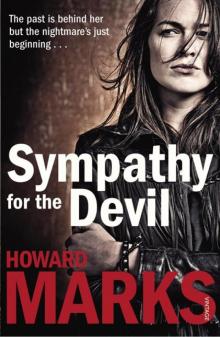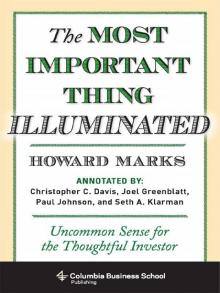- Home
- Howard Marks
The Score Page 18
The Score Read online
Page 18
Thomas stood by her side.
‘Stay with him. I’ll check the flat.’
She did so. The windows had been taped with blackout blinds. The first room they’d walked through was set up like a police operations room, the walls covered with wipe boards, cork tiles containing photographs studded with brightly coloured map pins. She looked at the cork board over his shoulder, catching sight of a photograph she recognised: Nia Hopkins in her long white shift dress, arms lifted as though in the throes of some religious ecstasy.
Next to the photo of Nia was a photo of another teenage girl dressed entirely in black – black skirt, black jumper, black lipstick, black nails, clutching a guitar, head thrown back, no longer trying to communicate the meaning of the song to an audience, but lost in some private world. More photos of girls. How many were there?
Cat went back to Thomas and Pale Face.
‘Take a look,’ she said and listened to Thomas stomping around the ops room. Pale Face wasn’t doing much of anything except holding his head where Thomas had hit him.
Thomas came back, silently angry, barrelled forward and picked the man up by the neck of his jacket. The man stood passively; stayed passive as Thomas back-handed him hard across the face. Then again. The man took his punishment wordlessly, allowing Thomas complete control of the situation. His face said this was what he had been expecting.
Cat’s own anger had long cooled. What mattered now was the case. She moved over to the desk. Except for the area nearest the window which contained a computer, its top was entirely covered with papers. Some of the papers were covered with spidery handwriting, although most were printouts from music websites. A stack of business cards – the logo: stylised crimson guitars dripping blood – announced Pale Face as ‘Paul Riley – Web Music Journalist’. Two phone numbers and an email address followed.
‘Riley?’ said Thomas
Riley nodded.
‘Who the fuck are you? Where is Esyllt Tilkian?’
‘Hey, aren’t you forgetting something?’ said Cat plaintively.
‘Oh yes, and why the fuck did you try to kill my colleague here? That’s my job.’
Thomas gave him another slap.
‘Sorry. I thought … It was a stupid thing to do. Sorry.’ The bruises were already rising fast on Riley’s face, not that Cat was too upset about that, but his apology sounded almost genuine.
She wanted Thomas to stop hitting him, though, so she took control.
‘Your name is Paul Riley?’
He nodded calmly.
‘You are a music journalist?’
‘I am.’
‘You write for – who exactly?’
‘Freelance. Web-zines. Music mags. Whatever gigs I can get.’
‘OK. And you were in Tregaron recently?’
‘You know I was.’
‘Don’t get fucking lippy,’ said Cat. ‘Thomas here would like any excuse to rip your head off. Any excuse at all.’
Riley nodded. His words were slurred because of the blows he’d taken to the mouth. ‘Sorry.’
‘Why were you in Tregaron? What was your fucking interest in Esyllt Tilkian? Or in me, if it comes to that?’
‘Can I show you? Next door?’
Cat nodded. Shadowed closely by a brooding Thomas, they went to the ops room. Riley used a remote to turn on a ceiling projector. Jiggled a mouse to un-hibernate a PC.
‘OK. The ultimate picture show,’ he said.
He clicked first to a YouTube page and let the video play. It was difficult to pinpoint exactly how old the woman in the video was, but she was several years older than Nia. Cat estimated early to mid twenties. She wore tight-fitting black jeans and a T-shirt embossed with the image of a vampire. She was standing on a small stage of which only a limited section was lit. She looked nervous, was massaging her left fist in her right hand.
‘Lisa Marr,’ Riley said, his voice softer and more cultured than Cat had expected. ‘From Glasgow. She disappeared fourteen months ago.’
Lisa Marr started to sing along to a backing track. Cat felt the jolt of recognition. She was performing Radiohead’s ‘Street Spirit’, just as Nia Hopkins had done. But Lisa was not enjoying the song, her hands were clenched with anxiety, her eyes fixed on the ceiling, a place, presumably, where she felt some salvation lay.
She was transported with the same intensity that Cat had noted in Nia Hopkins’s performance. Her voice was heavily influenced by folk, Joni Mitchell maybe, a dash of Emmylou Harris. The performance area was cropped into a small circle by a spotlight, darkness at the margins.
Riley clicked on another link, another video, another performance of the same song, this time by a hippy chick with hair dyed magenta. She sang in an accent that sounded Eastern European. ‘Katie Tana,’ Riley said tonelessly. ‘From Croatia. Another wannabe. Lived around the East End. Disappeared a year ago.’
The last girl was British and closer to Nia’s age. Also, apparently, missing. The girl, Riley told them, was seventeen but she was tiny, looked tired, fragile. Her voice was thin and reedy, not pleasant to listen to. Her accent sounded Mancunian. Riley gave her name as Sara Armitage.
Thomas took the names they hadn’t been aware of and called them through to the police database. He listened and, holding his hand over the mouthpiece, he said to Cat, ‘They check out.’
She said, ‘The Croat girl, lived around the East End, she could be the body from the Stratford landfill. Do you want to order dental checks? DNA if we can sort it?’
Thomas followed her reasoning and nodded. He spent another few minutes on the phone. Riley sat dabbing at his face, trying to measure his injuries. Then Thomas was done.
‘Now,’ said Riley, ‘Esyllt Tilkian, like the others, covered the track online.’ He took in the effect of his words. ‘She didn’t use her own name,’ he explained. ‘EasyT, her handle.’
Cat realised her mistake. She’d searched for Martin’s daughter’s web presence under her real name, had not thought to ask Martin if she had a nickname; not thought either to search for the song itself, to cross check her information that way. Stupid. A few years ago she’d have thought to do that, a few months ago maybe, but the trank withdrawal had dulled her brain. ‘What about Delyth Moses?’ Cat asked before Riley had even booted Esyllt’s online video clip.
‘Delyth: DeMo. Her username.’
‘Fuck,’ said Cat, and Thomas glared at her, not, she guessed because he thought she’d failed, but because she was showing Riley her exasperation.
Thomas waded in, tried to put Riley on the back foot. ‘So, some girls sing the same bloody song. What cobblers have you made out of that?’
In answer, Riley stopped Esyllt’s booting clip, called up a page captured from an online music encyclopaedia, the page’s title ‘Street Spirit (Fade Out)’. He slapped his hand against the wall, his eyes wide and staring as if his point was obvious. He was jubilant. Riley was taking control now and they were letting him.
No matter, Cat and Thomas still stood between him and the door.
‘Thom Yorke, Radiohead’s singer, has been quoted extensively about “Street Spirit”,’ Riley went on, his voice challenging, insolent, a believer revealing sacred knowledge to the uninitiated. ‘He says that the song is about how no matter which way you play it, the devil always wins.’
‘How did you make these connections?’ Cat’s question.
‘I knew one of the girls a little – Sara Armitage, the Manchester girl. Saw her at an open-mic night, kept in touch. Then she went missing. I happened to see the other YouTube videos. I think the site itself suggested the links. Then I pissed around seeing if there was any connection there.’
‘Then you thought, Let me see, what should I do with this information?’ said Thomas. ‘Shall I go to the police and maybe save some lives? Or shall I fuck around trying to sell a story?’
‘I don’t make a lot. It was a big deal for me.’
Thomas gave Riley another crunching open-handed slap then put his mou
th up close to the man’s ear. ‘I’m not going to hit you any more because Price here doesn’t like it. But we don’t like fucking journalists who leave girls to be killed because they’re chasing a story.’
Riley nodded. His earlier passive acceptance was starting to look worn now. He was hurting.
‘What’s your theory?’ Cat’s question. Quiet. Not aggressive because there was no need for aggression here. There had already been too much.
‘OK. Have you ever heard of the Tartini Devil’s Trill myth?’ Riley wasn’t expecting an answer. He pulled up an image, a picture of the devil wearing a frockcoat and playing the violin. ‘Giuseppe Tartini. Eighteenth-century composer. Composed a piece for violin called the “Devil’s Trill Sonata”. Story is that Tartini had a dream in which the devil dictated the sonata to him. When it was first performed it was so ahead of its time, so technically demanding, that the story gained currency.’
Thomas’s scepticism was etched on his face. ‘And you think that “Street Spirit” is like this “Devil’s Trill” thing. Like a curse.’
‘Yes.’
‘So the devil’s killing girls, is he, for singing his song?’ snarled Thomas.
‘Not the devil, no,’ Riley answered. ‘One of his followers perhaps.’
‘What, someone like you?’
Riley looked at Thomas. ‘I was going after a story, yes. I should have talked to the police, yes. But in truth, I also thought you’d tell me to get lost. I mean: the Devil’s Song, some missing girls, some YouTube clips? What would you have done with that?’
It was a fair point. Neither Thomas nor Cat felt like answering.
‘I did speak to Esyllt. I told her about the disappearances. I told her to watch out. I gave her my mobile number and told her she could reach me at any time. She was more important than the story. I thought I could do both: help her, get the story.’
Thomas and Cat exchanged looks.
‘And running me over?’
‘I panicked. I saw your bike following me around, thought you must have been them. Whoever they are. I’m sorry.’
He seemed stupid, but genuine. Scared of another thumping from Thomas, but even he was losing the appetite.
‘You’re sorry?’ Cat was incredulous. ‘You tried to kill me.’ She felt her feelings rising despite herself. Some late-release afterburn of shock.
‘No! No, it wasn’t that.’ Riley’s face was working. Real anxiety now, nothing fake.
‘Yes?’ Cat felt herself hard-wound for action. She could see her next moves, feel them. The blow to the face, hard. Knocking the head back for a clean chop at the throat. She almost felt the actual shock of each impact. But she didn’t move. Just said it again. ‘Yes?’
‘When I saw you were trying to follow me, I assumed you were after the girl. Her or me. When I threw the branch, I meant to give you a shock. Same thing when I came back. I thought I’d zoom past your head, scare you off.’
Riley didn’t finish, but Cat remembered the mud on the side of the road. She’d lost control on it. He probably hadn’t been in control when he came by. A bloody stupid manoeuvre, and it could easily have killed her, but she believed him.
She breathed out, releasing.
Final questions then. ‘And what were you doing an hour ago? And why? We know half the story already. If you lie about one single tiny detail, I swear to God we will arrest you right now. Conspiracy to murder.’
Riley dabbed his swollen lips with his hand, playing for time, maybe, but also being careful.
‘OK. There’s another angle into all this: Griff Morgan. He’s just been released from prison. He’s holed up at home, terminal cancer, waiting to die.’
Thomas and Cat exchanged glances. That name again. Cat experienced her light bulb moment, or a pallid echo of it anyway. The killer behind bars. The impossible murders. It was strange how often his name threaded its way into this whole thing.
‘Go on.’ Thomas’s command this time.
‘There are photographers camped outside his house, trying to get a view of him. I was over there too. There’s an empty building – big renovation job – scaffolding up the side. I thought I could get a view of it all from there.’
‘Why?’
‘Because.’ Riley clicked on another file then hesitated. ‘A few years back there were rumours that Morgan had a girlfriend who also sang the song. Not long afterwards she died in some fire on a boat. Apparently Morgan was never the same after that.’ Cat remembered Della Davies’s story from the papers she’d looked at in their stake-out.
Thomas groaned as if he’d already heard enough, but Riley continued.
‘In the chatrooms there were rumours that after the girl’s death some worker in a hotel Morgan was staying at heard the song playing over and over from his room. He went in the room, and there were all the girl’s things out, as if she had just walked out of the room. But the room was empty, just the song playing over and over.’
He caught their eyes.
‘And the names? A version of that story’s been in the press, but no names.’
‘No names. This was on chatrooms a good few years back. But when I looked – and I looked for hours – I couldn’t find anything there any more.’ Riley shrugged.
Thomas raised his eyebrows and laughed. ‘So, what, that was really the devil in Morgan’s room was it? Playing his song. That’s just urban myth bullshit.’ He stared hard at Riley.
Cat tried to laugh, but felt a shiver pass through her body despite herself. She wasn’t quite sure why, the story was nonsense, just a camp-fire tale.
Riley’s laptop had returned to his screen saver, a still from an old horror film. On the ground a pentangle made of candles flickered. A Hammer House starlet stood on a stage, her mouth open in a frozen scream. Across the stage fell a shadow from a large, horned shape off-screen. Thomas made a snorting noise. ‘Stay here,’ he commanded. Riley wasn’t looking like a man about to go anywhere fast.
Cat and Thomas moved out of earshot.
‘Spirited off by bloody devil worshippers,’ said Thomas. ‘And I’ve got a fucking pixie up my arse.’ He reminded Cat that Riley’s story hadn’t mentioned any drugs yet there was almost certainly a deal going down in the scaffolded house. Then again, the scaffolding had been as good a place as any to watch Morgan’s from.
Cat thought it through. ‘We give the drugs lead to the Met. I think we have to do that. Get them to do forensics on this place – she waved round Riley’s apartment – in case he’s lying about the drugs. But we take him to Cathays and interview him under caution. Get a proper statement about his relationship to Esyllt and everything else.’
‘There’s an ABH charge there, if you want it.’
Thomas meant the assault outside Tregaron. Riley had already admitted enough to make a charge of Actual Bodily Harm stick. Possibly even attempted manslaughter, though with a skidding in the mud defence, that would be hard to prove. Cat shook her head. What was the point? And ABH was a minor offence anyway.
‘OK. But it’ll be Camarthen not Cathays, Price.’ This would remain a Dyfed-Powys case, not a South Wales one.
She nodded, shrugged, like she didn’t care.
Cat’s shrug was good enough for Thomas. He pulled out his phone, came over all official. Rang the drugs info into the Met, called for a stake-out at the scaffolding house, forensics on Riley’s place. Phoned Camarthen, brought his commander up to date. They’d love that there. Bloody love it. Small town on the fag end of Wales and all of a sudden a case of national magnitude. The two dead Tregaron girls, Delyth and Nia, plus Esyllt, the missing one. Plus Lisa Marr, the Glaswegian; Sara Armitage, the skinny Mancunian; and Katie Tana, the Croat, quite possibly last seen dead in a landfill. All that, plus another link, albeit a tenuous one, to Morgan.
Cat went back through to Riley. Told him what was happening. They’d be willing to drop any talk of arrest, but in exchange they’d demand maximum cooperation. A full statement. All notes from his enquiry to be handed over.
His computers and phone records to be taken. And he would confirm that a scuffle had taken place when he’d encountered her and Thomas.
His broken face grinned a bit at that. ‘Resisting arrest, eh? You still use that one?’
‘You did try to kill me, you little fuck,’ Cat said gently.
Riley shrugged. ‘It’s OK. I’ll call it quits if you do.’
They shook hands.
Cat took a spare memory stick from Riley’s desk and downloaded what he told her were the relevant directories. The computer itself was heading off to Camarthen, but Cat wanted the opportunity to explore further herself. She picked up his phone, copied the caller records to her own, then passed it to Thomas.
A moment later, there were sirens outside. White forensic vans and uniformed officers. Showtime.
You wanted to be a vessel. You wanted to be authentic. You’ve spent your whole life wanting not to be one of those others. You want to be you. You want to express passion. You want to find the right song and let it speak through you.
And then you discover the cruel truth. There are no short cuts. You can’t choose when you opt in. You can’t just flip the telly over and listen. True passion does not allow short cuts.
The darkness cannot be faked.
There are only two paths to authenticity and you have to walk them both. Pain. And fear. They have you by the hand, and you are theirs now.
You know already, you will never see your family again.
14
THE DOJO WAS on the east side of Bethnal Green. Seen from the outside it was a fight centre from central casting. Reinforced door. Laminated noticeboard advertising an upcoming fight. Graffiti. Just twenty yards away, a dimly lit alley bursting with rubbish.
Inside, it was different. A dojo is not a boxing ring. The spiritual aspect is as important as the martial one. More important, in fact. The original dojos were adjuncts to monasteries, cared for and used by the novice monks as part of their spiritual practice.

 Mr Nice
Mr Nice The Howard Marks Book of Dope Stories
The Howard Marks Book of Dope Stories Senor Nice: Straight Life From Wales to South America
Senor Nice: Straight Life From Wales to South America The Score
The Score Sympathy for the Devil
Sympathy for the Devil The Most Important Thing Illuminated
The Most Important Thing Illuminated Senor Nice
Senor Nice Howard Marks' Book of Dope Stories
Howard Marks' Book of Dope Stories